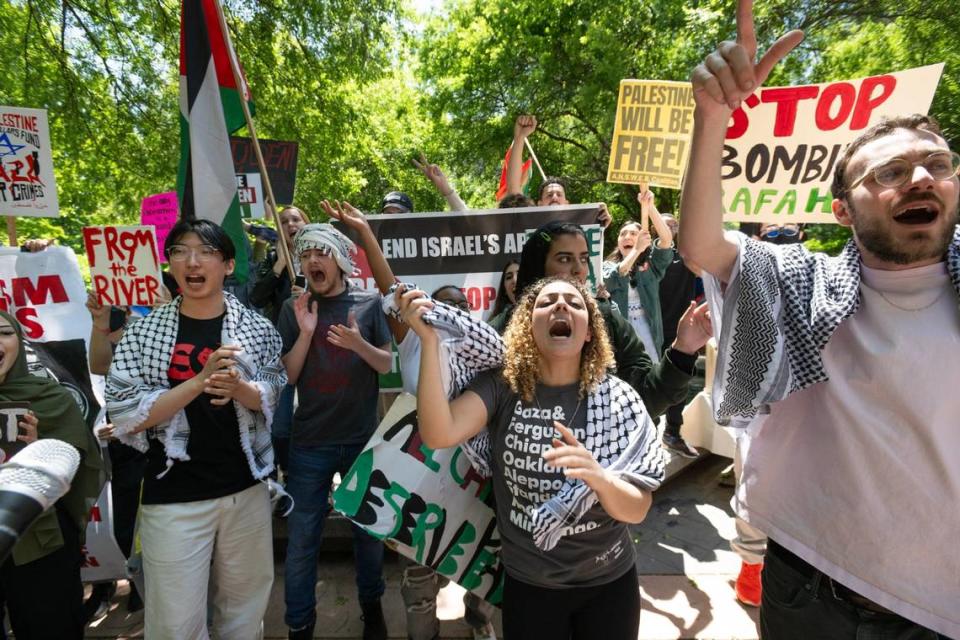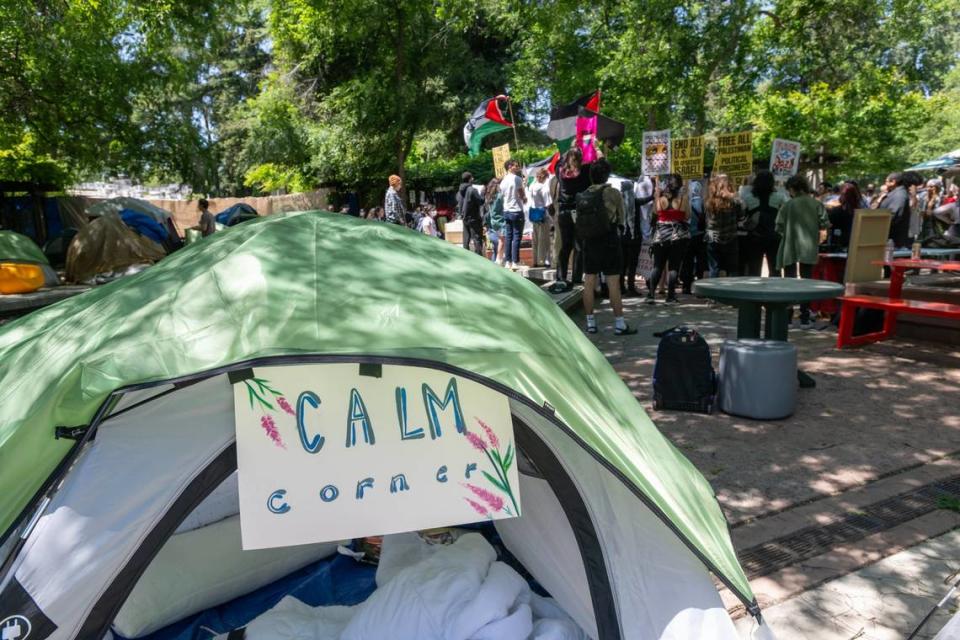Sacramento State reviewing investments as part of agreement with pro-Palestinian protesters
Cheers rang out from the heart of Sacramento State’s campus Wednesday as pro-Palestine protesters danced to celebrate the university’s agreement to divest in Israel-tied investments, the move coming eight days after demonstrators pitched tents on campus.
The agreement to change its investment and university policy language came late Tuesday night between Students for Justice in Palestine, other protesters and California State University, Sacramento.
The move makes the university one of the first CSU campuses to agree to alter its policies amid the ongoing war in Gaza, which has killed more than 34,000 Palestinians living in Gaza since Hamas attacked Israel on Oct. 7, killing more than 1,200 Israelis in the deadliest attack on Jews since the Holocaust.
“As soon as we walk into this encampment, it feels like a different America,” said Farah, a protester who declined to give her last name due to fears of being doxxed. “It feels like we took back this plaza for ourselves.”
Updates to Sac State’s policies, signed off on by university President Luke Wood, show a variety of changes.
It includes Sac State seeking its five auxiliaries to investigate its direct and indirect investments to ensure practices of only “socially responsible investment strategies which include not having direct investments in corporations and funds that profit from genocide, ethnic cleansing, and activities that violate fundamental human rights.”

The five auxiliaries are the Associated Students, University Enterprises Inc., University Union, University Foundation at Sac State and Capital Public Radio.
Sac State noted in its policy that the University Foundation does not have “any direct investments” with corporations and funds that have ties to the Israeli military. Farah said on Wednesday the university has $4.5 million in indirect investments with the Middle East nation.
Students for Justice in Palestine also said teachers from the Faculty for Justice in Palestine will sit on Sac State’s finance committee to review any possible divestments.
“We have created a policy on socially responsible investment,” the university said in a statement Wednesday. “We believe it’s important that our efforts to fund students’ education do not rely upon us benefiting from companies that profit from ethnic cleansing, genocide or human rights violations.”
Lanaya Lewis, a university spokeswoman, did not answer questions about which indirect investments Sac State holds or when the divestments would become effective.
The policy also added sections denouncing genocide and supporting student’s peaceful activism.
“CSU Sacramento opposes and condemns all acts of genocide, ethnic cleansing, terrorism and other activities that violate fundamental human rights,” the policy said. “Student protests and political action are cornerstones of higher education and democracy, and we unequivocally condemn hate and bias in all forms.
The Students for Justice Palestine and several other non-university affiliated groups have been camped out on the library quad since April 29 in protest of the war between Israel and Hamas. Since March, protests have proliferated on college campuses across the nation as pro-Palestinian groups have demanded universities divest from companies backing Israel and its military, denounce any genocide and defend student activism.
Student organizers across the 23-campus CSU system have taken different approaches to protests and occupations, but of those who have made demands, theirs are nearly identical: they all want university administrators to disclose any financial ties to Israel or Israeli companies and, if such financial ties exist, that the university divest from them.
Some protests — notably at Columbia University, USC and UCLA — have ended in arrests over the past week. The first such arrests by law enforcement came April 30 at Cal Poly Humboldt when 31 demonstrators were detained after a week of protests and the occupation of two campus buildings.
Demonstrations on Sac State’s campus, however, have remained peaceful and the protesters have been allowed to remain on campus, though the groups faced a deadline of 11:59 p.m. Wednesday to abandon their tents, a time that was expected to be extended if the groups remained peaceful.
However, the demonstrators said Wednesday they were planning to take down the encampment and donate their tents to the protest that began Monday at UC Davis.

Protesters on Wednesday vowed their activism wasn’t complete, and won’t stop until CSU system Chancellor Mildred Garcia also divests.
The CSU as a whole has declined to “alter existing investment policies related to Israel or the Israel-Hamas conflict.” It noted the university has not invested in direct stocks or equities in any companies.
“While the CSU affirms the right of our community members to express diverse viewpoints, a divestment of this sort impinges on the academic freedom of our students and faculty and the unfettered exchange of ideas on our campuses,” the statement said.
A CSU spokesperson did not respond to a request for comment Wednesday about Sac State’s decision.

